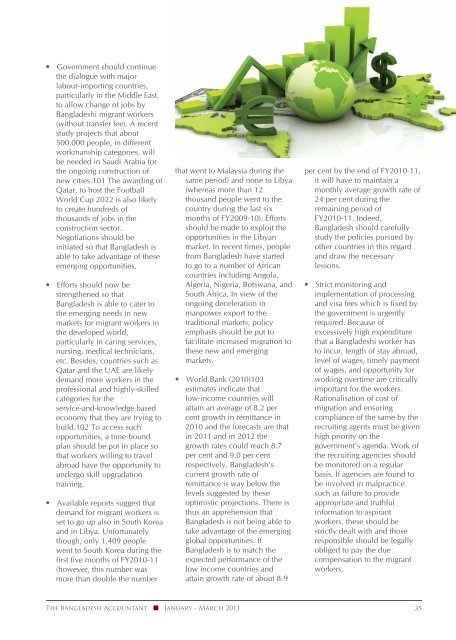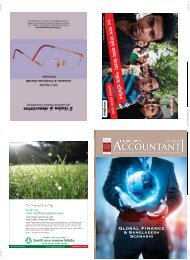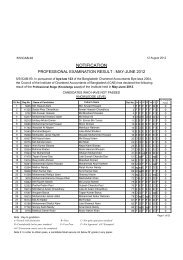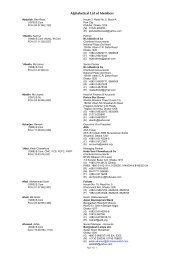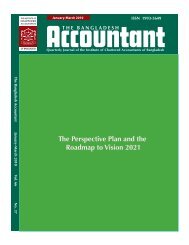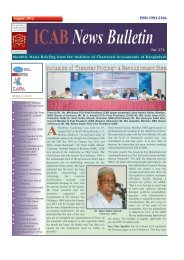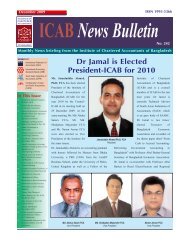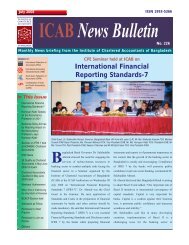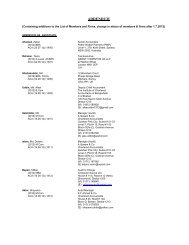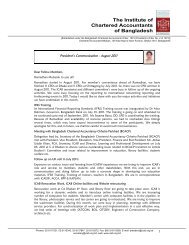Forma # 1.ai - ICAB
Forma # 1.ai - ICAB
Forma # 1.ai - ICAB
Create successful ePaper yourself
Turn your PDF publications into a flip-book with our unique Google optimized e-Paper software.
• Government should continue<br />
the dialogue with major<br />
labour‐importing countries,<br />
particularly in the Middle East,<br />
to allow change of jobs by<br />
Bangladeshi migrant workers<br />
(without transfer fee). A recent<br />
study projects that about<br />
500,000 people, in different<br />
workmanship categories, will<br />
be needed in Saudi Arabia for<br />
the ongoing construction of<br />
new cities.101 The awarding of<br />
Qatar, to host the Football<br />
World Cup 2022 is also likely<br />
to create hundreds of<br />
thousands of jobs in the<br />
construction sector.<br />
Negotiations should be<br />
initiated so that Bangladesh is<br />
able to take advantage of these<br />
emerging opportunities.<br />
• Efforts should now be<br />
strengthened so that<br />
Bangladesh is able to cater to<br />
the emerging needs in new<br />
markets for migrant workers in<br />
the developed world,<br />
particularly in caring services,<br />
nursing, medical technicians,<br />
etc. Besides, countries such as<br />
Qatar and the UAE are likely<br />
demand more workers in the<br />
professional and highly‐skilled<br />
categories for the<br />
service‐and‐knowledge based<br />
economy that they are trying to<br />
build.102 To access such<br />
opportunities, a time‐bound<br />
plan should be put in place so<br />
that workers willing to travel<br />
abroad have the opportunity to<br />
undergo skill upgradation<br />
training.<br />
• Available reports suggest that<br />
demand for migrant workers is<br />
set to go up also in South Korea<br />
and in Libya. Unfortunately<br />
though, only 1,409 people<br />
went to South Korea during the<br />
first five months of FY2010‐11<br />
(however, this number was<br />
more than double the number<br />
that went to Malaysia during the<br />
same period) and none to Libya<br />
(whereas more than 12<br />
thousand people went to the<br />
country during the last six<br />
months of FY2009‐10). Efforts<br />
should be made to exploit the<br />
opportunities in the Libyan<br />
market. In recent times, people<br />
from Bangladesh have started<br />
to go to a number of African<br />
countries including Angola,<br />
Algeria, Nigeria, Botswana, and<br />
South Africa. In view of the<br />
ongoing deceleration in<br />
manpower export to the<br />
traditional markets, policy<br />
emphasis should be put to<br />
facilitate increased migration to<br />
these new and emerging<br />
markets.<br />
• World Bank (2010)103<br />
estimates indicate that<br />
low‐income countries will<br />
attain an average of 8.2 per<br />
cent growth in remittance in<br />
2010 and the forecasts are that<br />
in 2011 and in 2012 the<br />
growth rates could reach 8.7<br />
per cent and 9.0 per cent<br />
respectively. Bangladesh’s<br />
current growth rate of<br />
remittance is way below the<br />
levels suggested by these<br />
optimistic projections. There is<br />
thus an apprehension that<br />
Bangladesh is not being able to<br />
take advantage of the emerging<br />
global opportunities. If<br />
Bangladesh is to match the<br />
expected performance of the<br />
low income countries and<br />
attain growth rate of about 8‐9<br />
per cent by the end of FY2010‐11,<br />
it will have to maintain a<br />
monthly average growth rate of<br />
24 per cent during the<br />
remaining period of<br />
FY2010‐11. Indeed,<br />
Bangladesh should carefully<br />
study the policies pursued by<br />
other countries in this regard<br />
and draw the necessary<br />
lessons.<br />
• Strict monitoring and<br />
implementation of processing<br />
and visa fees which is fixed by<br />
the government is urgently<br />
required. Because of<br />
excessively high expenditure<br />
that a Bangladeshi worker has<br />
to incur, length of stay abroad,<br />
level of wages, timely payment<br />
of wages, and opportunity for<br />
working overtime are critically<br />
important for the workers.<br />
Rationalisation of cost of<br />
migration and ensuring<br />
compliance of the same by the<br />
recruiting agents must be given<br />
high priority on the<br />
government’s agenda. Work of<br />
the recruiting agencies should<br />
be monitored on a regular<br />
basis. If agencies are found to<br />
be involved in malpractice<br />
such as failure to provide<br />
appropriate and truthful<br />
information to aspirant<br />
workers, these should be<br />
strictly dealt with and those<br />
responsible should be legally<br />
obliged to pay the due<br />
compensation to the migrant<br />
workers.<br />
The Bangladesh Accountant January - March 2011 35


